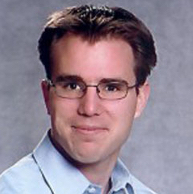Keynotes
Joerg Widmer
Abstract: The high bandwidth available at millimeter-wave frequencies allows for very high data rates, and the latest wireless technologies are already starting to exploit this part of the radio spectrum to achieve rates of several GBit/s per user. Communication at these frequencies typically uses directional antennas which brings about interesting challenges to align antenna beams. Given the high penetration loss, most obstacles (e.g., a person) also completely block the signal. This results in a very dynamic radio environment and channels may appear and disappear over very short time intervals. This keynote highlights some approaches to deal with these networking challenges. The very large bandwidth at mm-wave frequencies also allows to design highly accurate location systems, and such location information be used to facilitate beam training, optimize access point association, and predict (and counteract) future blockage. We discuss how to implement such a location system on off-the-shelf devices and present a millimeter-wave network optimization mechanism based on simultaneous localization and mapping of the environment.
 About the speaker:
Joerg Widmer is Research Professor and Research Director of IMDEA Networks in Madrid, Spain. Before, he held positions at DOCOMO Euro-Labs in Munich, Germany and EPFL, Switzerland. His research focuses on wireless networks, ranging from extremely high frequency millimeter-wave communication and MAC layer design to mobile network architectures. Joerg Widmer authored more than 150 conference and journal papers and three IETF RFCs, and holds 13 patents. He was awarded an ERC consolidator grant, the Friedrich Wilhelm Bessel Research Award of the Alexander von Humboldt Foundation, a Mercator Fellowship of the German Research Foundation, a Spanish Ramon y Cajal grant, as well as eight best paper awards. He is an IEEE Fellow and Distinguished Member of the ACM.
About the speaker:
Joerg Widmer is Research Professor and Research Director of IMDEA Networks in Madrid, Spain. Before, he held positions at DOCOMO Euro-Labs in Munich, Germany and EPFL, Switzerland. His research focuses on wireless networks, ranging from extremely high frequency millimeter-wave communication and MAC layer design to mobile network architectures. Joerg Widmer authored more than 150 conference and journal papers and three IETF RFCs, and holds 13 patents. He was awarded an ERC consolidator grant, the Friedrich Wilhelm Bessel Research Award of the Alexander von Humboldt Foundation, a Mercator Fellowship of the German Research Foundation, a Spanish Ramon y Cajal grant, as well as eight best paper awards. He is an IEEE Fellow and Distinguished Member of the ACM.
Jérôme Härri
Abstract: Next Generation IoT (NG-IoT) architectures and applications are cornerstone to radical innovations in various applications domains, such as industry 4.0, smart transportation, health or agriculture. Key enablers for NG-IoT are hyper-connectivity (5G+), edge-cloud computing and AI/ML, leading to the generalization of knowledge creation at the edge but also to growing autonomy of edge entities. Supporting NG-IoT requirements, 5G sidelink communication enables device-to-device and soon even multi-hop ad hoc communications. Edge-cloud platforms provides processing, storage and intelligence closer to IoT devices or even integrated with IoT devices. And recent federated or gossip learning mechanisms pave the way to cooperative knowledge creations between edge entities. With cooperative knowledge creation between edge-cloud platforms over peer-to-peer wireless links comes the challenge of knowledge segmentation, where knowledge location is not unique and where various versions of a given knowledge may be available in different locations or time. Knowledge at the edge therefore opens the era of knowledge networking. This keynote first highlights NG-IoT cooperative decentralized innovations, covering 5G sidelink and ad hoc multi-hop networking, edge-cloud and dew computing, and federated/gossip machine learning. It then introduces a framework for knowledge-centric networking, emphasizing challenges behind autonomously naming and creating knowledge or identifying and locating knowledge. It finally illustrates the impact of the proposed framework with selected use cases of knowledge networking applied to connected vehicles.
 About the speaker:
Jérôme Härri is Professor with the Communication Systems Department, EURECOM, Sophia Antipolis, France, where he leads the Connected Automated Transport System (CATS) team in the Networked Systems group. Previously, he led the Traffic Telematics Junior Research Group of the Institute of Telematics, Karlsruhe Institute of Technology, Karlsruhe, Germany. His research interests are related to wireless vehicular communication and networking, traffic flow modelling, internet-of-things (IoT), or control system optimization, in particular their mutual interactions in future automated vehicles. Jérôme has authored and coauthored over 80 international journal and conference papers, is involved in various national and European research projects related to connected vehicles, and actively contributes to various Standardization bodies. Jérôme Härri received the M.Sc. and the Dr. ès Sc. (PhD) degrees in telecommunication from the Swiss Institute of Technology (EPFL), Lausanne, Switzerland. He is Associate Editor for Frontier in Future Transportation as well as for the Hindawi Journal of Advanced Transportation.
About the speaker:
Jérôme Härri is Professor with the Communication Systems Department, EURECOM, Sophia Antipolis, France, where he leads the Connected Automated Transport System (CATS) team in the Networked Systems group. Previously, he led the Traffic Telematics Junior Research Group of the Institute of Telematics, Karlsruhe Institute of Technology, Karlsruhe, Germany. His research interests are related to wireless vehicular communication and networking, traffic flow modelling, internet-of-things (IoT), or control system optimization, in particular their mutual interactions in future automated vehicles. Jérôme has authored and coauthored over 80 international journal and conference papers, is involved in various national and European research projects related to connected vehicles, and actively contributes to various Standardization bodies. Jérôme Härri received the M.Sc. and the Dr. ès Sc. (PhD) degrees in telecommunication from the Swiss Institute of Technology (EPFL), Lausanne, Switzerland. He is Associate Editor for Frontier in Future Transportation as well as for the Hindawi Journal of Advanced Transportation.